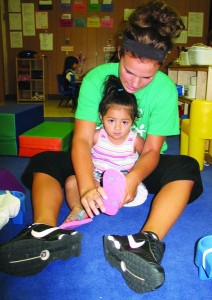Article by Jodelle Greiner – Staff Writer , Fairmont Sentinel
WINNEBAGO – Giving kids the tools they need to make it in school is the goal behind Tri-Valley Opportunity Council’s Head Start for migrant seasonal workers at Winnebago.
“Our ultimate goal is to prepare the children for kindergarten, so they succeed long term in school,” said Cally Ingebritson, family and community services specialist.
Tri-Valley has 14 locations across the state, but this is the first year for the one in Winnebago. Each location times its Head Start to coincide with the crop cycle in the area, so the one in Winnebago began in June and will conclude at the end of this month. Other sites could run late into the fall.

There are about 30 children at the Winnebago site, located at St. Mary’s Catholic Church, ranging in age from infants to those who have started kindergarten in the past couple of weeks.
The parents of these kids follow the crops, working in fields or factories, nearly always on the move.
“Most of the kids are born in the United States,” Ingebritson said, “and live their whole lives in the U.S., but like birds, their families go between Minnesota and Texas.”
It’s a tough life, she said.
“The families work really hard; these are the families who are feeding us,” Ingebritson said. “Farm work is the lowest-paid work, second only to domestic housework. These children face a lot because their families are so low-income; multiple challenges other kids don’t face.
“It’s hard for these kids to stay on track with their education,” she said. “That’s why there’s a special version of Head Start.”
Head Start does educational and health screenings, makes sure kids are on track with immunizations, and enhances education at an appropriate age level. For example, teachers in the toddler room work on colors. Older kids may learn numbers. Games include matching colors and shapes.
Mostly, they just get the kids adapted to being in a classroom.
“Socialization is a big thing when the kids had no preschool,” said Ingebritson, pointing out that some of the kids have stayed at home with older siblings in the past.
“It’s a challenge just because the population we serve is so mobile,” she said. “These children haven’t had any services in the past few years. Having them in a safe center, learning and happy is a better option.”
Since it is the program’s first year in Winnebago, Ingebritson has no comparisons on the impact it has had on the children, but she said that national studies of Head Start programs have shown that every dollar invested will save the government between $7 and $19 down the line.
“Statistically, more kids who go to Head Start programs will graduate, avoid disease, are less likely to need remedial support, are less likely to have teen pregnancies and go to jail,” Ingebritson said.
She has much higher hopes for these kids.
“Our goal is to make sure they are educationally and developmentally prepared for school,” Ingebritson said. “I’d like them to graduate high school and go to college, long, long-term.”
